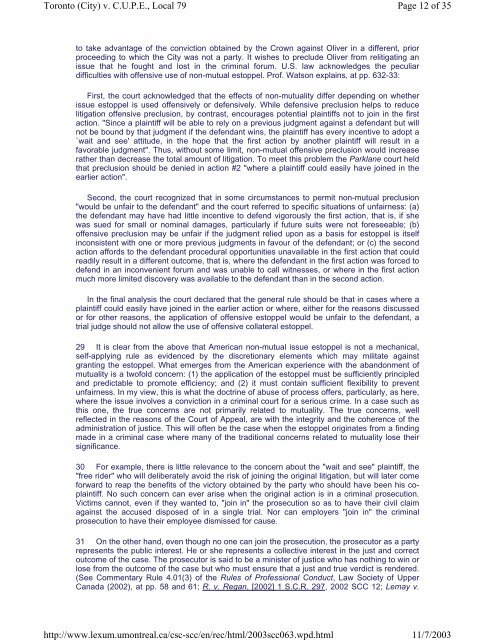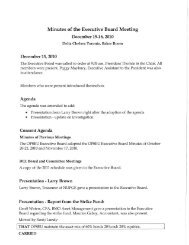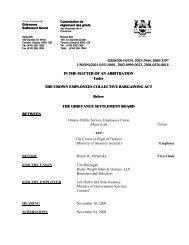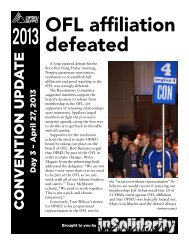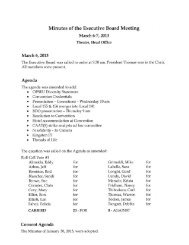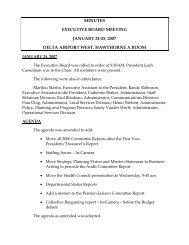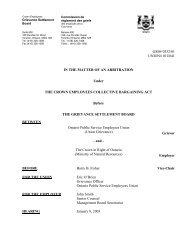C.U.P.E., Local 79 v. Toronto (City) .pdf - OPSEU
C.U.P.E., Local 79 v. Toronto (City) .pdf - OPSEU
C.U.P.E., Local 79 v. Toronto (City) .pdf - OPSEU
You also want an ePaper? Increase the reach of your titles
YUMPU automatically turns print PDFs into web optimized ePapers that Google loves.
<strong>Toronto</strong> (<strong>City</strong>) v. C.U.P.E., <strong>Local</strong> <strong>79</strong><br />
http://www.lexum.umontreal.ca/csc-scc/en/rec/html/2003scc063.wpd.html<br />
Page 12 of 35<br />
11/7/2003<br />
to take advantage of the conviction obtained by the Crown against Oliver in a different, prior<br />
proceeding to which the <strong>City</strong> was not a party. It wishes to preclude Oliver from relitigating an<br />
issue that he fought and lost in the criminal forum. U.S. law acknowledges the peculiar<br />
difficulties with offensive use of non-mutual estoppel. Prof. Watson explains, at pp. 632-33:<br />
First, the court acknowledged that the effects of non-mutuality differ depending on whether<br />
issue estoppel is used offensively or defensively. While defensive preclusion helps to reduce<br />
litigation offensive preclusion, by contrast, encourages potential plaintiffs not to join in the first<br />
action. "Since a plaintiff will be able to rely on a previous judgment against a defendant but will<br />
not be bound by that judgment if the defendant wins, the plaintiff has every incentive to adopt a<br />
`wait and see' attitude, in the hope that the first action by another plaintiff will result in a<br />
favorable judgment". Thus, without some limit, non-mutual offensive preclusion would increase<br />
rather than decrease the total amount of litigation. To meet this problem the Parklane court held<br />
that preclusion should be denied in action #2 "where a plaintiff could easily have joined in the<br />
earlier action".<br />
Second, the court recognized that in some circumstances to permit non-mutual preclusion<br />
"would be unfair to the defendant" and the court referred to specific situations of unfairness: (a)<br />
the defendant may have had little incentive to defend vigorously the first action, that is, if she<br />
was sued for small or nominal damages, particularly if future suits were not foreseeable; (b)<br />
offensive preclusion may be unfair if the judgment relied upon as a basis for estoppel is itself<br />
inconsistent with one or more previous judgments in favour of the defendant; or (c) the second<br />
action affords to the defendant procedural opportunities unavailable in the first action that could<br />
readily result in a different outcome, that is, where the defendant in the first action was forced to<br />
defend in an inconvenient forum and was unable to call witnesses, or where in the first action<br />
much more limited discovery was available to the defendant than in the second action.<br />
In the final analysis the court declared that the general rule should be that in cases where a<br />
plaintiff could easily have joined in the earlier action or where, either for the reasons discussed<br />
or for other reasons, the application of offensive estoppel would be unfair to the defendant, a<br />
trial judge should not allow the use of offensive collateral estoppel.<br />
29 It is clear from the above that American non-mutual issue estoppel is not a mechanical,<br />
self-applying rule as evidenced by the discretionary elements which may militate against<br />
granting the estoppel. What emerges from the American experience with the abandonment of<br />
mutuality is a twofold concern: (1) the application of the estoppel must be sufficiently principled<br />
and predictable to promote efficiency; and (2) it must contain sufficient flexibility to prevent<br />
unfairness. In my view, this is what the doctrine of abuse of process offers, particularly, as here,<br />
where the issue involves a conviction in a criminal court for a serious crime. In a case such as<br />
this one, the true concerns are not primarily related to mutuality. The true concerns, well<br />
reflected in the reasons of the Court of Appeal, are with the integrity and the coherence of the<br />
administration of justice. This will often be the case when the estoppel originates from a finding<br />
made in a criminal case where many of the traditional concerns related to mutuality lose their<br />
significance.<br />
30 For example, there is little relevance to the concern about the "wait and see" plaintiff, the<br />
"free rider" who will deliberately avoid the risk of joining the original litigation, but will later come<br />
forward to reap the benefits of the victory obtained by the party who should have been his coplaintiff.<br />
No such concern can ever arise when the original action is in a criminal prosecution.<br />
Victims cannot, even if they wanted to, "join in" the prosecution so as to have their civil claim<br />
against the accused disposed of in a single trial. Nor can employers "join in" the criminal<br />
prosecution to have their employee dismissed for cause.<br />
31 On the other hand, even though no one can join the prosecution, the prosecutor as a party<br />
represents the public interest. He or she represents a collective interest in the just and correct<br />
outcome of the case. The prosecutor is said to be a minister of justice who has nothing to win or<br />
lose from the outcome of the case but who must ensure that a just and true verdict is rendered.<br />
(See Commentary Rule 4.01(3) of the Rules of Professional Conduct, Law Society of Upper<br />
Canada (2002), at pp. 58 and 61; R. v. Regan, [2002] 1 S.C.R. 297, 2002 SCC 12; Lemay v.


